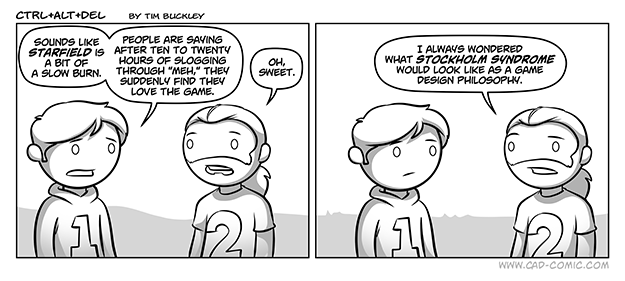I’ve touched before on my dislike for the mechanic in games that claim to offer you choice, but then tie up other elements into those options that almost remove the choice entirely. The inFamous series is perhaps one of the most transparent, but Bioware does it often as well.
What they really boil down to is a choice to experience the story one way or another. You’ll get different dialogue/interactions/powers depending on if you decide to play as a good guy and a bad guy. And that’s great. In a way, it doubles the replayability of a game for people who want to see all outcomes. I have no problem with the system when looked at strictly from that perspective.
But ultimately, the system really only offers you one choice. And you typically make it before you’ve even fire up the game, or perhaps when you’re faced with your first decision. You decide if you’ll play good or evil. But from there on out, since the games only really reward complete and unwavering commitment to your initial path.
And since the choices they provide you are often very clearly “good” or “evil”, it requires no thought or guesswork. There’s no you in those individual choices.
I think the most recent game I’ve played that did player choice in a meaningful way was The Banner Saga. None of the choices were black and white. There were moral choices to be made that sometimes felt right or wrong depending on your viewpoint, but you never knew how other people in the game would react.
It’s been out long enough that I’m going to talk about one choice in particular that stuck with me, but still, spoiler warning. At one point as I was leading my army of men and giants across the frozen wastes, some of our horses or oxen got spooked, and ran towards a cliff. A wagon with precious food and supplies was teetering precariously over the edge, and I had to decide what to do. Do I try and save it? Do I let it go? Given that we were dangerously low on food already, and I didn’t want people to starve, I sent people to pull the cart back.
One of my best Varl warriors, whom I had been actively leveling, ended up going to help. He was tangled up in the ropes and pulled over the cliff when the entire cart went. He was gone, just like that.
I was stunned. Clearly the game hadn’t told me flat out “you could lose one of your guys if this goes badly”, but I knew there was inherent danger in the attempt. I made what I thought was the right choice. It wasn’t clearly good or evil. But it had a disastrous outcome.
I was shocked that the game would do that, take away one of my warriors so mercilessly. But I wasn’t angry. And it made me truly examine my choices for the rest of that game. Not just on the superficial level, but to consider what other possible ripple effects my decision could have.
In a lot of cases, The Banner Saga asked me to decide between two equally shitty choices, with no happy outcome. Rather, which depressing and painful outcome was I more ready to live with. Furthermore, those choices would, sometimes, result in gaining supplies, or gaining followers/warriors, or losing them. But it was never spelled out “if you do this, you will receive this.” And those choices made more of an impression, and made the game more impactful, than the “will you kill this guy or let him live” black and white options so many games give you.
I haven’t played inFamous: Second Son yet… I’m looking forward to it. Visually, it was one of the games that sold me on the PS4. And maybe their choices are a little more thoughtful, but since there’s a clear reward tied to them, I’m not hopeful. And I’ll likely enjoy the game regardless of my disappointed views on the superficial choice mechanic. After all, it’s only a portion of the gameplay.
Still, when a game claims to offer me choice, my standards are set a little higher than what we typically get.











